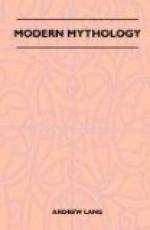Dualistic Myths
A not unnatural theory of the Origin of Death is illustrated by a myth from Pentecost Island and a Red Indian myth. In the legends of very many races we find the attempt to account for the Origin of Death and Evil by a simple dualistic myth. There were two brothers who made things; one made things well, the other made them ill. In Pentecost Island it was Tagar who made things well, and he appointed that men should die for five days only, and live again. But the malevolent Suque caused men ’to die right out.’ {187} The Red Indian legend of the same character is printed in the Annual Report of the Bureau of Ethnology (1879-80), p. 45. The younger of the Cin-au-av brothers, who were wolves, said, ’When a man dies, send him back in the morning and let all his friends rejoice.’ ’Not so,’ said the elder; ‘the dead shall return no more.’ So the younger brother slew the child of the elder, and this was the beginning of death.
Economic Myth
There is another and a very quaint myth of the Origin of Death in Banks Island. At first, in Banks Island, as elsewhere, men were immortal. The economical results were just what might have been expected. Property became concentrated in the hands of the few—that is, of the first generations—while all the younger people were practically paupers. To heal the disastrous social malady, Qat (the maker of things, who was more or less a spider) sent for Mate—that is, Death. Death lived near a volcanic crater of a mountain, where there is now a by-way into Hades—or Panoi, as the Melanesians call it. Death came, and went through the empty forms of a funeral feast for himself. Tangaro the Fool was sent to watch Mate, and to see by what way he returned to Hades, that men might avoid that path in future. Now when Mate fled to his own place, this great fool Tangaro noticed the path, but forgot which it was, and pointed it out to men under the impression that it was the road to the upper, not to the under, world. Ever since that day men have been constrained to follow Mate’s path to Panoi and the dead. {188} Another myth is somewhat different, but, like this one, attributes death to the imbecility of Tangaro the Fool.




